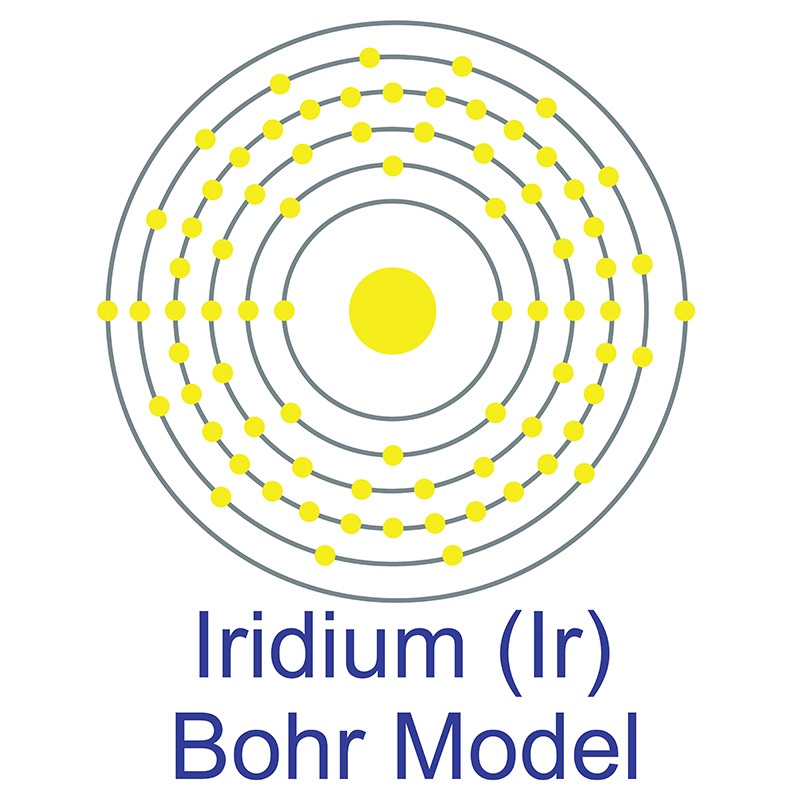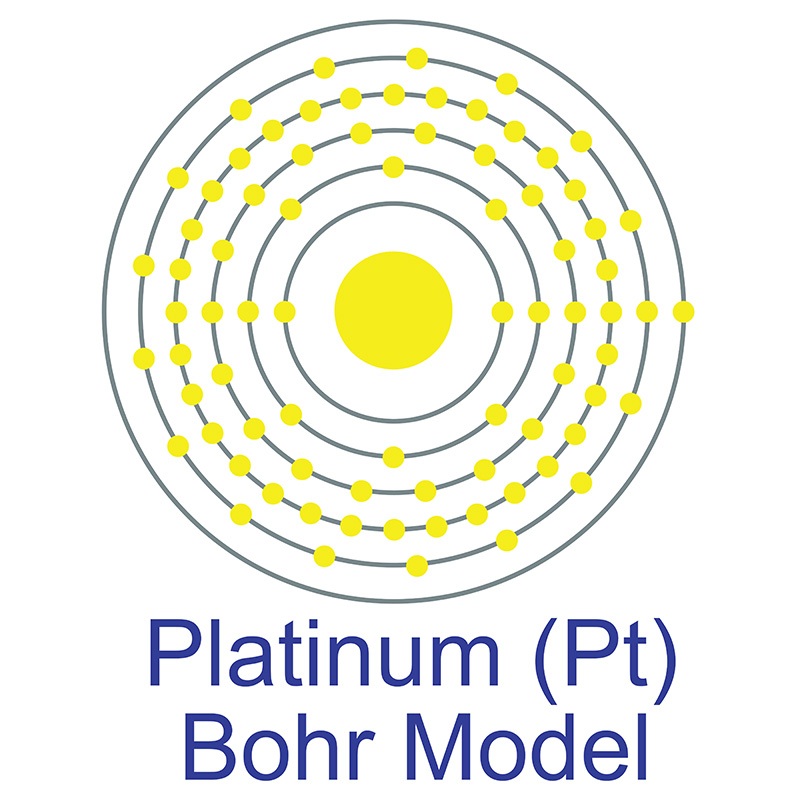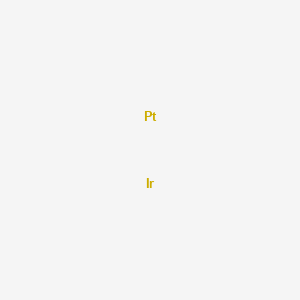See more Iridium products. Iridium (atomic symbol: Ir, atomic number: 77) is a Block D, Group 9, Period 6 element with an atomic weight of 192.217. The number of electrons in each of iridium's shells is [2, 8, 18, 32, 15, 2] and its electron configuration is [Xe] 4f14 5d7 6s2.  The iridium atom has a radius of 136 pm and a Van der Waals radius of 202 pm. Iridium was discovered and first isolated by Smithson Tennant in 1803. In its elemental form, Iridium has a silvery white appearance. Iridium is a member of the platinum group of metals.
The iridium atom has a radius of 136 pm and a Van der Waals radius of 202 pm. Iridium was discovered and first isolated by Smithson Tennant in 1803. In its elemental form, Iridium has a silvery white appearance. Iridium is a member of the platinum group of metals. It is the most corrosion resistant metal known and is the second-densest element (after osmium). It will not react with any acid and can only be attacked by certain molten salts, such as molten sodium chloride. Iridium is found as an uncombined element and in iridium-osmium alloys. Iridium's name is derived from the Greek goddess Iris, personification of the rainbow, on account of the striking and diverse colors of its salts.
It is the most corrosion resistant metal known and is the second-densest element (after osmium). It will not react with any acid and can only be attacked by certain molten salts, such as molten sodium chloride. Iridium is found as an uncombined element and in iridium-osmium alloys. Iridium's name is derived from the Greek goddess Iris, personification of the rainbow, on account of the striking and diverse colors of its salts.
Materials
Materials by Form
2D Materials Alloy & Alloy Forms Pure Metals & Metal FormsCeramic FibersFoams: Metallic & Ceramic High Purity Materials Isotopes MXenesOxides Rare Earths Semiconductors Solutions
Chemicals & Salts
All Chemicals & Salts Acetates Aluminides Ammonium Sulfates Antimonides Arsenates Benzoate Bromates Bromides Carbonates Chlorides Chromates Fluorides Hydrides Hydroxides Iodates Iodides Lactates Molybdates Nitrates Oxalates Oxides Perchlorates Phosphates Selenates Selenides Selenites Silicates Stearates Sulfates Sulfides Sulfites Tantalates Tellurates Tellurides Tellurites ThiocyanatesVanadates
Ceramics
Nanomaterials
Organometallics
Materials by Application
Additive Manufacturing & 3D Printing Battery & Supercapacitor Materials Catalysts Dental Materials Electronics Materials Fuel Cell Materials Fusion EnergyGlass Manufacturing Green Technology & Alternative Energy Hydrogen Storage Laser Crystals Life Sciences & Biomaterials Metallurgy Nanotechnology & Nanomaterials Optical Materials Photovoltaic & Solar Energy Plating Pigments & Coatings Research & Development Space Technology Sputtering Targets Thin Film Deposition Water Treatment Weather Modification
Life Science Chemicals
Life Science Products AlcoholsAldehydesAmidesAminesAmino Acids & DerivativesAromaticsArylsAzetidinesBenzimidazolesBenzisoxazolesBenzodioxansBenzofuransBenzothiazolesBenzothiophenesBenzoxazolesCarboxylic AcidsEnzymes & InhibitorsEstersEthersFluorinated Building BlocksFuransHalidesImidazolesImidazolidinesIndazolesIndolesIndolinesIsoquinolinesIsoxazolesKetonesMorpholinesNaphthyridinesNitrilesOrganoboronOrganosiliconOxadiazolesOxazolesPharmaceuticals & IntermediatesPhenolsPhytochemicalsPiperazinesPiperidinesPyrazinesPyrazolesPyridazinesPyridinesPyrimidinesPyrrolesPyrrolidinesPyrrolinesQuinazolinesQuinolinesQuinoxalinesSpiroesSulfonyl ChloridesTetrahydroisoquinolinesTetrahydropyransTetrahydroquinolinesTetrazolesThiadiazolesThiazolesThiazolidinesThiolsThiophenesTriazinesTriazoles
About Us
Locations
Austria Belgium Brazil Canada China & Hong Kong Czech Republic Denmark Finland France Germany Greece Hungary India Indonesia Israel Italy Japan Malaysia Mexico Netherlands Norway Philippines Poland Portugal Russia Singapore South Korea Spain Sweden Switzerland Taiwan Thailand Turkey United Kingdom United States
Industries
Aerospace Agriculture Automotive Chemical Manufacturing Defense Dentistry Electronics Energy Storage & Batteries Fine Art Materials Fuel CellsFusion Energy Glass Investment Grade Metals Jewelry & Fashion Lasers Lighting Medical Devices Museums & Galleries Nuclear Energy Oil & Gas Optics Paper & Pulp Pharmaceuticals & Cosmetics Research & Laboratory Robotics Solar Energy Space Sports Equipment Steel & Alloy Producers Textiles & Fabrics Water Treatment Municipalities
Follow Us

 Platinum was discovered and first isolated by Antonio de Ulloa in 1735. It is one of the rarest elements in the earth's crust, occurring at a concentration of only 0.005 ppm. Platinum is found uncombined as a free element and
Platinum was discovered and first isolated by Antonio de Ulloa in 1735. It is one of the rarest elements in the earth's crust, occurring at a concentration of only 0.005 ppm. Platinum is found uncombined as a free element and 
